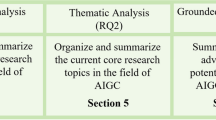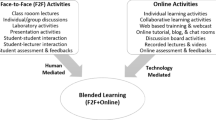Abstract
Professional organizations and researchers in the field of instructional design and technology (IDT) have attempted to identify the competencies that IDT professionals should possess using a variety of methods, including a job announcement analysis, surveys, and interviews. While most of the previous studies identified the IDT competences based on practitioners’ perspectives or the content of job announcements or program websites, this study examined leading scholars’ perspectives on the IDT competencies, curriculum, research, and the current state and the future directions of the IDT field. Qualitative data were collected from semi-structured interviews with 21 scholars from 16 US universities who had considerable teaching experience in the IDT field. The results revealed ways to improve the IDT curriculum in addition to six core competencies for IDT professionals. Further, five themes related to research in the IDT field were identified, and seven themes related to the future directions of the field were identified. The results of the study provide faculty, researchers, and practitioners in the IDT field with unique insights on how to improve IDT programs to better prepare students for the future in this rapidly changing world.
Similar content being viewed by others
References
AECT Definition and Terminology Committee. (2008). Definition. In A. Januszewski & M. Molenda (Eds.), Educational technology: A definition with commentary. Lawrence Erlbaum.
Bodily, R., Leary, H., & West, R. E. (2019). Research trends in instructional design and technology journals. British Journal of Educational Technology, 50(1), 64–79.
Carr-Chellman, A. A., Ma, Z., Almeida, L. C., Gursoy, H. T., Modak, R. S., & Pastore, R. S. (2008). Citations as a key to identity in the field of instructional design technology. TechTrends, 52(3), 64–69. https://doi.org/10.1007/s11528-008-0157-6
Chen, H., Dong, L., Tomita, K., & Eunkyung, M. (2016). Educational technology and instructional design in East Asia. TechTrends, 60, 525–527. https://doi.org/10.1007/s11528-016-0112-x
Giberson, T. R. (2010). Performance capabilities and competencies at the undergraduate and graduate levels for performance improvement professionals. Performance Improvement Quarterly, 22(4), 99–120. https://doi.org/10.1002/piq.20070
Homes, W., Bialik, M., & Fadel, C. (2019). Artificial intelligence in education: Promises and implications for teaching and learning. ISTE.
Januszewski, A., & Molenda, M. (2008). Educational technology: A definition with commentary. Lawrence Erlbaum Associates.
Kang, Y., & Ritzhaupt, A. D. (2015). A job announcement analysis of educational technology professional positions: Knowledge, skills, and abilities. Journal of Educational Technology Systems, 43(3), 231–256. https://doi.org/10.1177/0047239515570572
Klein, J. D., & Fox, E. J. (2004). Performance improvement competencies for instructional technologists. TechTrends, 48(2), 22–25. https://doi.org/10.1007/BF02762539
Klein, J. D., & Jun, S. (2014). Skills for instructional design professionals. Performance Improvement, 53(2), 41–46. https://doi.org/10.1002/pfi.21397
Klein, J. D., & Kelly, W. Q. (2018). Competencies for instructional designers: A view from employers. Performance Improvement Quarterly, 31(3), 225–247. https://doi.org/10.1002/piq.21257
Klein, J., Kumar, S., & Ritzhaupt, A. D. (2020). Project management competencies of educational technology professionals in higher education. Journal of Applied Instructional Design. https://doi.org/10.51869/93jkskadr
Martin, F., Kumar, S., & Ritzhaupt, A. D. (2022). An overview of the competencies and career outcomes in educational technology. In J. E. Stefaniak & R. M. Reese (Eds.), The instructional design trainer’s guide (1st ed.). Routledge.
Martin, F., & Ritzhaupt, A. D. (2021). Standards and competencies for instructional design and technology professionals. In J. K. McDonald & R. West E. (Eds.), Design for learning (1st ed.). EdTech Books.
Miles, M. B., Huberman, A. M., & Saldana, J. (2014). Qualitative data analysis: A methods sourcebook (3rd ed.). Sage.
Moallem, M. (1995). Analysis of job announcements and the required competencies for instructional technology professionals. Paper presented at the Annual Meeting of the American Educational Research Association, San Francisco.
Richey, R. C., Fields, D. C., & Foxon, M. (2001). Instructional design competencies: The standards (3rd ed.). ERIC Clearinghouse on Information and Technology.
Ritzhaupt, A. D., & Kumar, S. (2015). Knowledge and skills needed by instructional designers In higher education. Performance Improvement Quarterly, 28(3), 51–69. https://doi.org/10.1002/piq.21196
Ritzhaupt, A. D., & Martin, F. (2014). Development and validation of the educational technologist multimedia competency survey. Educational Technology Research and Development, 62, 13–33. https://doi.org/10.1007/s11423-013-9325-2
Ritzhaupt, A. D., Martin, F., & Daniels, K. (2010). Multimedia competencies for an educational technologist: A survey of professionals and job announcement analysis. Journal of Educational Multimedia and Hypermedia, 19(4), 421–449.
Ritzhaupt, A. D., Martin, F., Pastore, R., & Kang, Y. (2018). Development and validation of the educational technologist competencies survey (ETCS): Knowledge, skills, and abilities. Journal of Computing in Higher Education, 30, 3–33. https://doi.org/10.1007/s12528-017-9163-z
Sugar, W., Hoard, B., Brown, A., & Daniels, L. (2012). Identifying multimedia production competencies and skills of instructional design and technology professionals: An Analysis of recent job postings. Journal of Educational Technology Systems, 40(3), 227–249. https://doi.org/10.2190/ET.40.3.b
Sümüer, E., Kurşun, E., & Çağıltay, K. (2006). Current major competencies for instructional design and technology professionals. In E. Pearson & P. Bohman (Eds.), ED-MEDIA 2006—World conference on educational multimedia, hypermedia, and telecommunications. EDMEDIA.
Thomas, D. R. (2006). A general inductive approach for analyzing qualitative evaluation data. American Journal of Evaluation, 27(2), 237–246.
Wang, X., Chen, Y., Ritzhaupt, A., & Martin, F. (2021). Examining competencies for the instructional design professional: An exploratory job announcement analysis. International Journal of Training and Development, 25(2), 95–123. https://doi.org/10.1111/ijtd.12209
Yalçın, Y., Ursavaş, Ö. F., & Klein, J. D. (2021). Measuring instructional design competencies of future professionals: Construct validity of the ibstpi® standards. Education Technology Research Development, 69, 1701–1727. https://doi.org/10.1007/s11423-021-10006-7
Author information
Authors and Affiliations
Corresponding author
Ethics declarations
Conflict of interest
The author have no conflict of interest to declare.
Research involving human participants and/or animals
N/A.
Informed consent
The participants were asked to sign the informed consent form and send the signed form to the researcher via email before interviews.
Additional information
Publisher's Note
Springer Nature remains neutral with regard to jurisdictional claims in published maps and institutional affiliations.
Rights and permissions
Springer Nature or its licensor (e.g. a society or other partner) holds exclusive rights to this article under a publishing agreement with the author(s) or other rightsholder(s); author self-archiving of the accepted manuscript version of this article is solely governed by the terms of such publishing agreement and applicable law.
About this article
Cite this article
An, Y. Seasoned scholars’ perspectives on the core competencies, programs, research, and future directions of the field of instructional design and technology. Education Tech Research Dev 72, 895–914 (2024). https://doi.org/10.1007/s11423-023-10302-4
Accepted:
Published:
Issue Date:
DOI: https://doi.org/10.1007/s11423-023-10302-4




